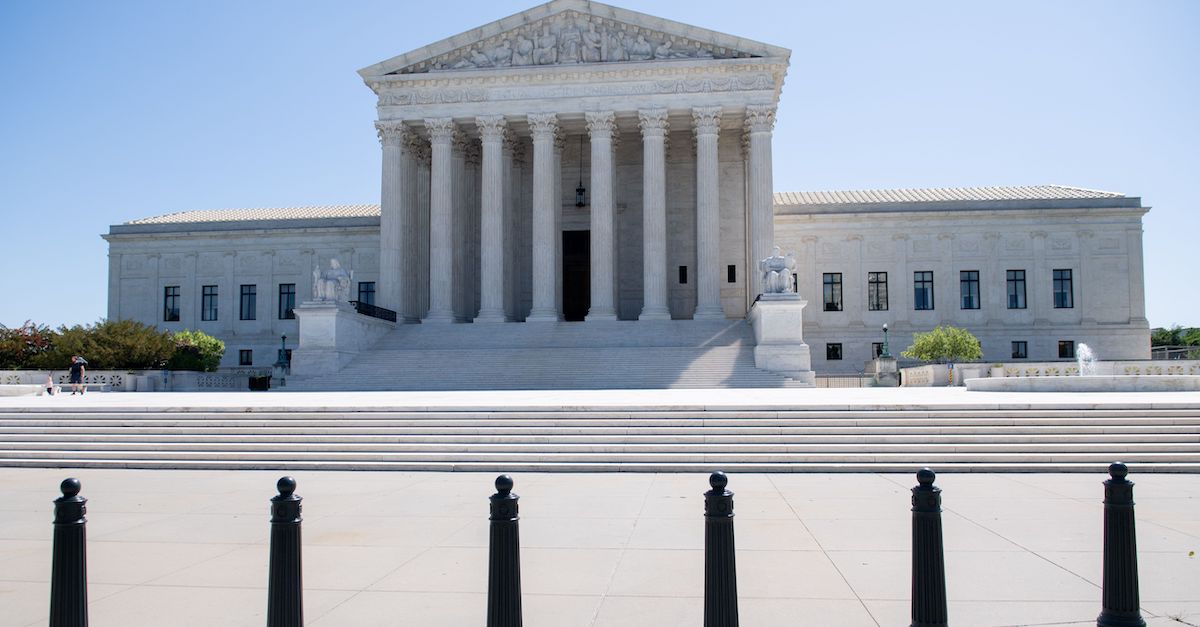
The Supreme Court of the United States will hear oral arguments in the “Faithless Elector” cases on Wednesday, May 13. Chiafalo v. Washington has been consolidated with Colorado Department of State v. Baca, and may mean a serious renovation of the electoral college. The case asks whether individual electors have the right to cast votes for someone other than their pledged candidate who won the most votes in their respective states.
Because elections are governed by state law, the specifics as to what happens to an elector who goes rogue vary from state to state.
The cases headed to SCOTUS involve high school teacher Micheal Baca and two other presumptive Hillary Clinton electors; in 2016, the trio cast ballots for Ohio Gov. John Kasich (R), despite Clinton’s having won Colorado’s popular vote. Baca was removed as an elector, and his vote was replaced with that of a Clinton voter.
In the companion case in Washington State, then-19-year-old elector Levi Guerra and two others, who declared themselves “Hamilton Electors,” attempted to keep Donald Trump out of office by casting votes for more moderate Republicans instead of Clinton, who’d won the state’s popular vote.
Law&Crime spoke with Executive Director of Equal Citizens Jason Harrow, who represents Colorado electors Micheal Baca and Polly Baca (who are unrelated). Harrow will argue the case before the Supreme Court on Wednesday. He explained that his clients “were not seeking to hold the election on their own shoulders” by exercising independent judgment in a manner that nullifies the will of the voters. Quite the opposite, he said. His clients, Harrow contends, knew that Colorado’s 2016 votes were as much against Trump as they were for Clinton. By casting a vote for a more moderate Republican, these electors were attempting to effect what Harrow called a “good faith compromise” that squared better with what voters really wanted. Allowing electors to function this way, Harrow argued, allows the electoral college to function as intended – as a kind of safety valve.
Harrow said that SCOTUS should not hesitate to rule in his favor, because so-called “faithless electing” would only influence the outcome of an election if it were done with bipartisan support. “If that safety valve is exercised in a bipartisan way — if those people want to come together, and depart from what the expectation is,” Harrow said, “it needs to be taken seriously.”
When making his argument to the Supreme Court, Harrow intends to raise a bit of American history, which is sure to intrigue some of the history buffs on the bench (looking at you, Justices Clarence Thomas and Neil Gorsuch). There are some important past cases that demonstrate the value of allowing electors to exercise some degree of independent judgment.
The presidential election of 1872 (which was ultimately won by Ulysses S. Grant) offered newspaper editor Horace Greeley as a candidate. Greeley won in six states, but died before the electoral college was balloted. The majority of the electors who were meant to vote for Greeley split their votes among other candidates. Three electors, however, insisted on voting for Greeley–notwithstanding his death. Ultimately, Congress rejected those three–exceptionally faithful–electoral votes.
Another notable electoral college irregularity occurred in 1796, when Pennsylvania was slow to count its votes. The election between Thomas Jefferson and John Adams was very close, and electors were certified by the Pennsylvania governor before the election returns were all counted. Elector Samuel Miles had been pledged to vote for Adams, but when the time came, he voted for Jefferson as to accurately reflect the will of the Pennsylvania people.
“The same exact thing could happen in Pennsylvania in 2020,” Harrow warned.
He suggested a hypothetical: Pressured to meet a tight timeline, Governor Tom Wolf (D) certifies the Biden slate by a narrow margin of votes. Later, several thousand military votes come in from overseas – all cast for Trump, making Trump the state’s winner. Should the electors still vote for Biden, even though he wasn’t the state’s actual winner?
Without the discretion to vote in conformity with their consciences, electors could be legally barred from executing their intended function and carrying out the will of the voters.
The history, however, is considerably complex and subject to varied interpretation. Furthermore, there’s the constitutional issue at hand, which was where Tenth Circuit Judge Carolyn McHugh based her decision in favor of Micheal Baca. Judge McHugh reasoned that the Constitution’s use of the word “vote” implied some expectation of independent judgment on the part of electors that cannot be abrogated by a state.
When asked whether he was tailoring his arguments to any particular justices, Harrow optimistically said, “We think all the justices are in play, because this is a quirky case. With no political outcome at stake, it can be a buffet and you can make arguments that they all might find something appealing.”
Indeed, it likely isn’t lost on SCOTUS that its decision will not dictate the outcome of a presidential election. The cases before the bench relate to the 2016 election, and there’s no question that Donald Trump won. The question of faithless electing is, however, likely to show up in every presidential election until it’s settled–and the Supreme Court definitely does not want to be back where it was in 2000, when the fate of the American presidency rested on the Court’s decision. The sooner the Court can get faithless electors off its docket, the sooner it can go back to being “apolitical,” which could explain why this case was chosen for telephonic oral arguments instead of being put off until the coronavirus crisis has passed.
While the Court isn’t bound to issue its decision at any particular time, it is customary for the Court to do so by the end of the current term. That might mean a decision by mid-summer.
[Image via SAUL LOEB/AFP via Getty Images]